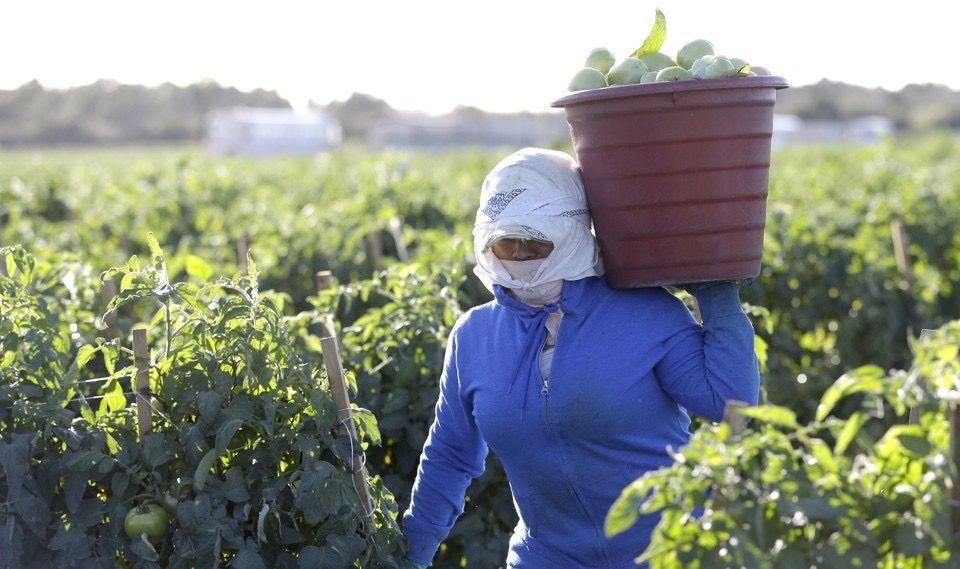
Investigative reporting out of The Atlantic charts devastating history of sexual violence in agriculture, identifies FFP as “source of hope” for the industry…
Last week, The Atlantic, one of the country’s longest-running magazines, published an in-depth piece on the prevalence of sexual violence in U.S. agriculture. After months of extensive research, both historical and of the current agricultural industry, the magazine singled out the CIW’s Fair Food Program as a rare example of success in combatting the scourge of farmworker sexual abuse, offering a ray of hope not only for agriculture, but for other low-wage industries across the country as well.
In the first section of The Atlantic’s extensive article, entitled “There’s a Sexual Harassment Epidemic on America’s Farms,” the author paints a bleak picture of farm labor conditions beyond the protections of the Fair Food Program. She examines the most recent forced labor operation brought to justice by the CIW’s Anti-Slavery Program, which took place on a small farm just 30 minutes from Immokalee in an area aptly named “Devil’s Garden”. The workers’ lawsuit took six long and painful years to resolve in civil court and resulted in a $3.5 million settlement. Through an extended interview with one of the survivors of the case, who faced both forced labor and sexual assault in the fields at the hands of her supervisor, Tapia Reyes-Ortiz, The Atlantic piece offers some of the most extensive reporting yet on the notorious forced labor operation.
Here’s an excerpt from the first section of The Atlantic piece:
There’s a Sexual-Harassment Epidemic on America’s Farms
Many of the women who work in agriculture often have few options but to put up with abuse on the job.
“…Perez kept pushing for [unpaid wages] she believed she was owed. As the situation escalated, Tapia-Ortiz sexually harassed Perez, according to the lawsuit. In 2011, she says, he promised to pay her more if she had sex with him, grabbed her from behind, and fondled her breasts. In August, according to the lawsuit, she says when she rejected his advances and threatened to call the police, he threatened to get her deported.
In the fall of 2011, according to the lawsuit, he made sexual advances while she was working in a secluded area among tall tomato plants. After she rejected him, he showed her his pistol in his waistband, she says. He would often wave a rifle or show the pistol to the workers to threaten them, according to the complaint. “Truly I did feel very intimidated and very fearful. I just arrived and I didn’t know anything about the laws or who to call or what I could say or how to say it,” Perez said to me.”
The author then takes the reader on a tour through the history of agriculture and centuries of unbroken farm labor abuse in the U.S., before ending in the 21st century with a look at one of the few beacons of hope in the industry: The Fair Food Program.
…There are signs of change in the industry. Organizations such as Alianza Nacional de Campesinas and the Coalition of Immokalee Workers have stepped in and pushed for important reforms and efforts within the industry. The Coalition of Immokalee Workers has developed the Fair Food Program to ensure major food suppliers purchased tomatoes from farms with good practices. It is a worker-developed partnership among farms, farmworkers, students, the faith community, and corporations. “We took deep experiential knowledge of what the issues are and turned that into a code of conduct and then went on to create all the necessary mechanisms to really change that power dynamic,” Rodriguez, the former farmworker and leader of the Coalition of Immokalee Workers, said.
Fair Food farms have a code of conduct and a series of mechanisms for workers to report sexual harassment and a monitoring system to make sure farms comply. The effort also leverages the power of large corporations to help individual farmworkers. There are 14 companies on board so far, including Walmart, McDonald’s, Subway, Whole Foods and Trader Joe’s. The system could be easily adapted to other industries, and CIW has already introduced it to dairy farms in Vermont. It represents hope for workers in an industry where, for generations, there’s been very little.
Make sure to head over to The Atlantic to read the full article!

